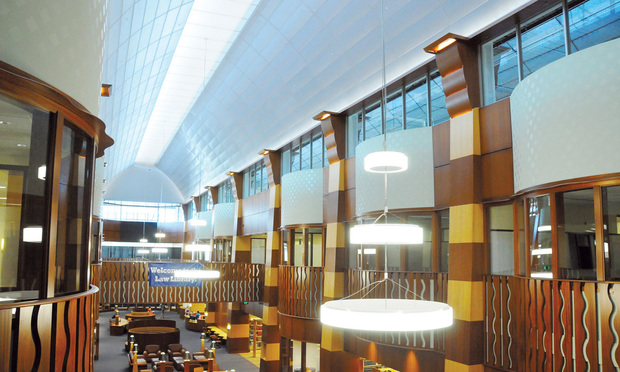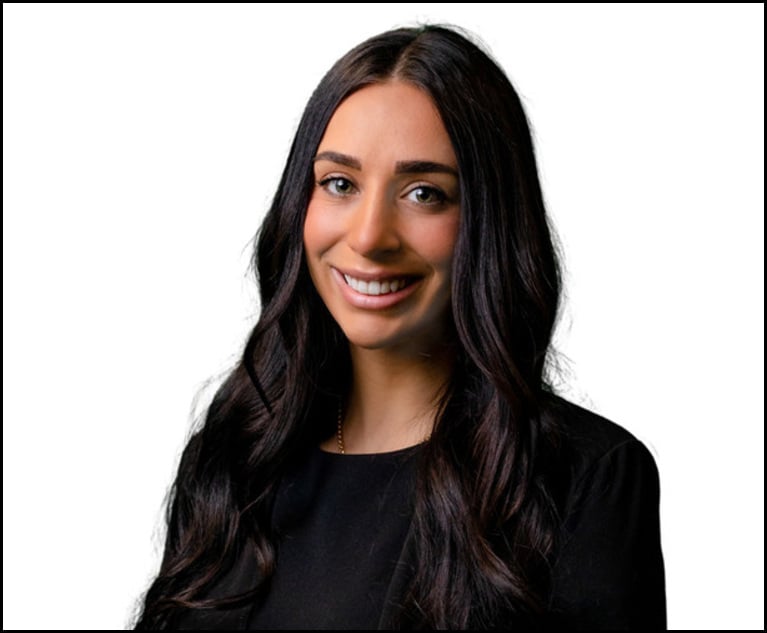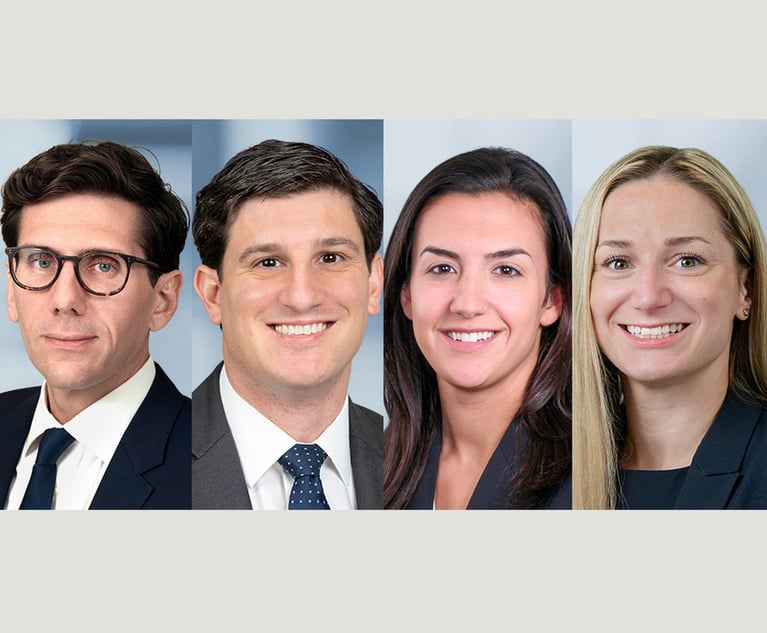New Rule Allows Connecticut Law School Grads to Go to Court Without Supervision—Before Passing the Bar Exam
"We like this new rule because it enables graduates to get started on their professional careers before the bar exam," said Timothy Fisher, dean of the University of Connecticut School of Law.
May 14, 2020 at 01:56 PM
4 minute read
 Quinnipiac University School of Law. Photo: Gary Lewis
Quinnipiac University School of Law. Photo: Gary Lewis
Faced with hundreds of Connecticut law school graduates not able to take the state bar examination in July due to COVID-19-related disruptions, the Rules Committee of Superior Court has approved recommendations to loosen guidelines to allow students to make court presentations—in some instances—without a supervising attorney present.
State law school deans and members of the Connecticut Bar Examining Committee, who made the recommendations that were adopted on Monday, said they realized it was essential to give graduating students a chance to practice law in the interim.
That, they said, would improve the graduates' chances of appealing to potential employers, who might be wary of hiring a candidate who hasn't had a chance to take the bar examination.
The rule is on a temporary and emergency basis.
The bar examination in Connecticut is now set for Sept. 30 and Oct. 1 in Hartford, but could be pushed back again if social-distancing protocols remain in place, making it unsafe to administer the tests in crowded areas.
"We like this new rule because it enables graduates to get started on their professional careers before the bar exam," said Timothy Fisher, dean of the University of Connecticut School of Law. "They can now do various kinds of client work and limited court appearances on their own, provided they have supervision from a more senior licensed attorney."
In the past, supervising attorneys were required to be present with law school graduates for various functions.
Now, the new adopted rule allows law school graduates to do the following without a supervising attorney present in civil cases: participate in short calendar calls and arguments; report and seek ratification from the court of a written agreement; conduct an unopposed foreclosure proceeding seeking judgment; take part in a pretrial conference or status conference; and participate in an uncontested dissolution of a marriage proceeding.
In addition, law school graduates can now also—with a supervising attorney present—make oral arguments before Connecticut's Appellate Court and Supreme Court.
The rule states only lawyers in good standing with the Connecticut bar who have no history of professional discipline, including administrative suspensions, can be supervising attorneys.
"I think everyone has … compassion for what the students are going through with this delay, and we made the best compromise we felt we could make," said Pullman & Comley member Anne Dranginis, chairwoman of the Connecticut Bar Examining Committee.
While Utah enacted diploma privileges for law school graduates because of COVID-19 and Wisconsin has, for a while, had diploma privileges for graduates of the University of Wisconsin Law School and Marquette University Law School, Dranginis said that route wasn't an option for Connecticut.
"It doesn't protect the public. Not testing minimal competence erodes confidence with the public," Dranginis said Thursday. "That was a nonstarter."
Brad Saxton, interim dean at Quinnipiac University School of Law, said getting attorneys to act as supervising attorneys could "be a challenge."
Saxton estimates between 350 and 500 graduates are planning to take the Connecticut bar examination later this year.
"We need to have lots of lawyers that are willing to work with a graduate student and be their supervisors," Saxton said. "We have been talking to the bar examining committee on what can be done about getting those attorney supervisors. We are looking to the Connecticut Bar Association for help and law schools are reaching out to alum. Many are already volunteering to be mentors, and maybe some of them would be willing under the new rules to supervise a recent graduate."
Related stories:
Connecticut Law Schools Looking to Reopen in the Fall
Connecticut's Bar Exam Pass Rate Jumps 5 Percentage Points
Who Passed the Connecticut Bar Exam? Here's a List
This content has been archived. It is available through our partners, LexisNexis® and Bloomberg Law.
To view this content, please continue to their sites.
Not a Lexis Subscriber?
Subscribe Now
Not a Bloomberg Law Subscriber?
Subscribe Now
NOT FOR REPRINT
© 2025 ALM Global, LLC, All Rights Reserved. Request academic re-use from www.copyright.com. All other uses, submit a request to [email protected]. For more information visit Asset & Logo Licensing.
You Might Like
View All
Preparing for Change? These Leaders Have Already Done It. Plus, Managing Partner Survey Results
8 minute read
False Claims Act Causation Standard Continues to Divide Federal Courts
5 minute readLaw Firms Mentioned
Trending Stories
Who Got The Work
J. Brugh Lower of Gibbons has entered an appearance for industrial equipment supplier Devco Corporation in a pending trademark infringement lawsuit. The suit, accusing the defendant of selling knock-off Graco products, was filed Dec. 18 in New Jersey District Court by Rivkin Radler on behalf of Graco Inc. and Graco Minnesota. The case, assigned to U.S. District Judge Zahid N. Quraishi, is 3:24-cv-11294, Graco Inc. et al v. Devco Corporation.
Who Got The Work
Rebecca Maller-Stein and Kent A. Yalowitz of Arnold & Porter Kaye Scholer have entered their appearances for Hanaco Venture Capital and its executives, Lior Prosor and David Frankel, in a pending securities lawsuit. The action, filed on Dec. 24 in New York Southern District Court by Zell, Aron & Co. on behalf of Goldeneye Advisors, accuses the defendants of negligently and fraudulently managing the plaintiff's $1 million investment. The case, assigned to U.S. District Judge Vernon S. Broderick, is 1:24-cv-09918, Goldeneye Advisors, LLC v. Hanaco Venture Capital, Ltd. et al.
Who Got The Work
Attorneys from A&O Shearman has stepped in as defense counsel for Toronto-Dominion Bank and other defendants in a pending securities class action. The suit, filed Dec. 11 in New York Southern District Court by Bleichmar Fonti & Auld, accuses the defendants of concealing the bank's 'pervasive' deficiencies in regards to its compliance with the Bank Secrecy Act and the quality of its anti-money laundering controls. The case, assigned to U.S. District Judge Arun Subramanian, is 1:24-cv-09445, Gonzalez v. The Toronto-Dominion Bank et al.
Who Got The Work
Crown Castle International, a Pennsylvania company providing shared communications infrastructure, has turned to Luke D. Wolf of Gordon Rees Scully Mansukhani to fend off a pending breach-of-contract lawsuit. The court action, filed Nov. 25 in Michigan Eastern District Court by Hooper Hathaway PC on behalf of The Town Residences LLC, accuses Crown Castle of failing to transfer approximately $30,000 in utility payments from T-Mobile in breach of a roof-top lease and assignment agreement. The case, assigned to U.S. District Judge Susan K. Declercq, is 2:24-cv-13131, The Town Residences LLC v. T-Mobile US, Inc. et al.
Who Got The Work
Wilfred P. Coronato and Daniel M. Schwartz of McCarter & English have stepped in as defense counsel to Electrolux Home Products Inc. in a pending product liability lawsuit. The court action, filed Nov. 26 in New York Eastern District Court by Poulos Lopiccolo PC and Nagel Rice LLP on behalf of David Stern, alleges that the defendant's refrigerators’ drawers and shelving repeatedly break and fall apart within months after purchase. The case, assigned to U.S. District Judge Joan M. Azrack, is 2:24-cv-08204, Stern v. Electrolux Home Products, Inc.
Featured Firms
Law Offices of Gary Martin Hays & Associates, P.C.
(470) 294-1674
Law Offices of Mark E. Salomone
(857) 444-6468
Smith & Hassler
(713) 739-1250












